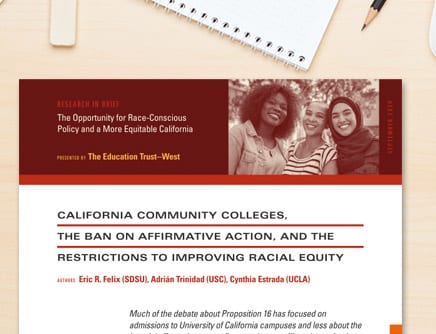Opportunity for All Coalition
California is one of the few states in the country where people of color have become the majority of the population. While the state has become increasingly diverse and is the 5th largest economy in the world, people of color are often underrepresented and have often faced barriers to success and opportunity to actualize the American dream. Whether it’s inequities in the state’s K-12 public school system, access and affordability challenges to colleges and universities, or the lack of diversity in tech and other sectors in the economy, it is a hard truth that structural racism exists and is real. It is especially evident now with COVID- 19 having a disproportionate effect on communities of color. It is simply not enough to know that structural racism is a problem. What matters most is that California policymakers and education leaders have the tools to structurally help end discrimination. It starts with restoring affirmative action this November election.

Research in Brief
and a More Equitable California
Detailing how Prop 16 will help the 2.1 million students at California’s Community Colleges.
Opportunity for All Coalition

The Education Trust-West joined the Steering Committee of Opportunity for All in January 2020 to help spearhead efforts to place Proposition 16 on this November’s ballot and further the organization’s mission to expose and eradicate injustice and inequities in California schools and colleges. Restoring affirmative action will provide schools and colleges the flexibility to employ race-conscious strategies necessary to improve public education for all California students.
Reinstating Affirmative Action Will Help…
Close Racial Opportunity Gaps
California’s Local Control Funding Formula provides school districts, county offices of education, and charter schools with supplemental funding to serve English learners, foster youth, and low-income students. Because of the twenty-five year ban on affirmative action, the LCFF overlooks the unique role of race in limiting educational opportunities both in terms of how the state funds LEAs and how LEAs support their students. The inability of LEAs to be race-conscious leaves LEAs without the resources needed to serve students facing some of the most severe opportunity gaps. Restoring affirmative action would provide an opportunity to strengthen LCFF by allocating supplemental funding to meet the needs of students of color who require additional academic support independent of their socio-economic status.
Recruit and Retain More Educators of Color
California’s public school children and their teachers look very different. Approximately 77 percent of the students in public schools are students of color, while 65 percent of teachers are white. Research shows teachers of color boost the academic performance of students of color and all students, including improved math scores, improved graduation rates, and increases in aspirations to attend college.Teachers of color are more likely to teach in schools with high numbers of low-income and students of color, and have higher rates of movement and turnover than their white peers.The repeal of Proposition 209 would allow the state to work with LEAs and institutions of higher education to develop recruitment and retention programs that target prospective teachers of color and improve teacher diversity to the benefit of all students.
Promote Diversity in California’s Public Universities
Support Prop 16 and Restore Affirmative Action in California
Volunteer
We will need all hands on deck to contact California voters. Volunteer with the Proposition 16 campaign
Stay Informed
Subscribe for updates on upcoming digital advocacy actions
Additional Resources
Frequently Asked Questions about Affirmative Action
Dispelling the Myths: Providing Opportunity for All Through ACA 5 – Higher Education Issues
Dispelling the Myths: Providing Opportunity for All Through ACA 5 – K-12 Education Issues
Coalition Letter in Support of ACA 5, organized by ETW and Public Advocates
Coalition Letter in Support of ACA 5, organized by Equal Justice Society



